UNIT 4 Beware of ads!
Unit 4 Beware of ads!
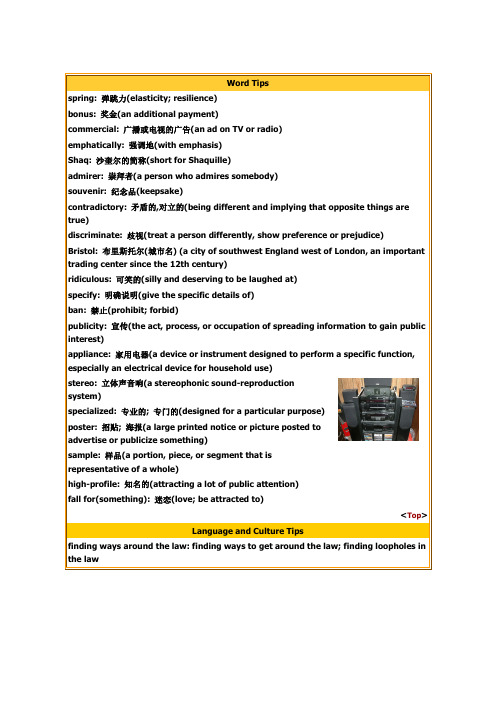
spring:弹跳力(elasticity; resilience)
bonus:奖金(an additional payment)
commercial:广播或电视的广告(an ad on TV or radio)
emphatically:强调地(with emphasis)
Shaq:沙奎尔的简称(short for Shaquille)
admirer:崇拜者(a person who admires somebody)
souvenir:纪念品(keepsake)
contradictory:矛盾的,对立的(being different and implying that opposite things are true)
discriminate:歧视(treat a person differently, show preference or prejudice)
high-profile:知名的(attracting a lot of public attention)
fall for(something):迷恋(love; be attracted to)
<Top>
Language and Culture Tips
finding ways around the law: finding ways to get around the law; finding loopholes in the law
Bristol:布里斯托尔(城市名) (a city of southwest England west of London, an important trading center since the 12th century)
Unit 4 Beware of ads!
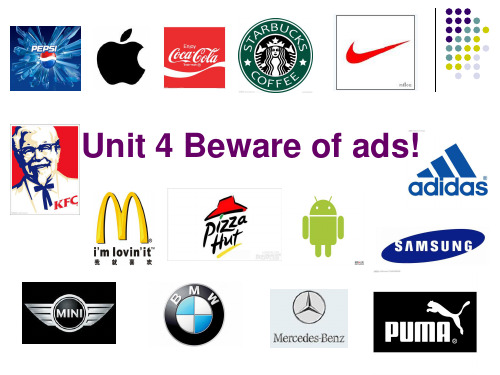
A diamond lasts forever. (De Bierrers)
钻石恒久远,一颗永流传。(第尔比斯钻石)
Fresh-up with Seven-up.
提神醒脑喝七喜。
Which slogan is the most appealing one for Coca-Cola ?
For reference
Some slogans sound too commonplace to attract my attention. For example, I would not be attracted by “How about a Coke?” Some slogans are not clear enough. When I read “Enjoy life” or “Enjoy” for the first time, I do not connect them with Coca-Cola. I may not have the time to read a long slogan like “ Whoever you are, whatever you do, wherever you may be, when you think of refreshment, think of ice-cold Coca-Cola.” However, because it is unusually long, it may attract some attention. I like slogans that are emotionally appealing such as “Refresh yourself” and “Life tastes good". But they are not as good as “Passport to refreshment”, whose language is vivid and unusual and is likely to stay in mind for a long time. A passport is a very important document, so this makes Coke sound important.
大学英语视听说课教学大纲
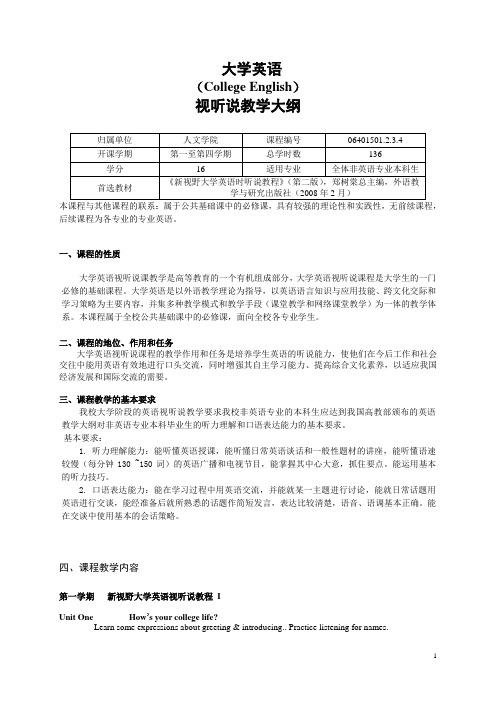
大学英语(College English)视听说教学大纲本课程与其他课程的联系:属于公共基础课中的必修课,具有较强的理论性和实践性,无前续课程,后续课程为各专业的专业英语。
一、课程的性质大学英语视听说课教学是高等教育的一个有机组成部分,大学英语视听说课程是大学生的一门必修的基础课程。
大学英语是以外语教学理论为指导,以英语语言知识与应用技能、跨文化交际和学习策略为主要内容,并集多种教学模式和教学手段(课堂教学和网络课堂教学)为一体的教学体系。
本课程属于全校公共基础课中的必修课,面向全校各专业学生。
二、课程的地位、作用和任务大学英语视听说课程的教学作用和任务是培养学生英语的听说能力,使他们在今后工作和社会交往中能用英语有效地进行口头交流,同时增强其自主学习能力、提高综合文化素养,以适应我国经济发展和国际交流的需要。
三、课程教学的基本要求我校大学阶段的英语视听说教学要求我校非英语专业的本科生应达到我国高教部颁布的英语教学大纲对非英语专业本科毕业生的听力理解和口语表达能力的基本要求。
基本要求:1. 听力理解能力:能听懂英语授课,能听懂日常英语谈话和一般性题材的讲座,能听懂语速较慢(每分钟130 ~150词)的英语广播和电视节目,能掌握其中心大意,抓住要点。
能运用基本的听力技巧。
2. 口语表达能力:能在学习过程中用英语交流,并能就某一主题进行讨论,能就日常话题用英语进行交谈,能经准备后就所熟悉的话题作简短发言,表达比较清楚,语音、语调基本正确。
能在交谈中使用基本的会话策略。
四、课程教学内容第一学期新视野大学英语视听说教程IUnit One How’s your college life?Learn some expressions about greeting & introducing.. Practice listening for names.Listening Skills: Listening for NamesFunctions: Greeting and IntrducingAutonomous Learning:First, students are required to do some listening, do some speakingand role-play, then do some exercises assigned by teacher related tounit one.Unit Two Do you work out?Asking for and giving directions are quite useful in our daily life. What kind of expressions, then, do you use when you ask for and give directions? If you aren’t quite sure of such expressions, never mind. The activities in this unit will be helpful.Listening Skills: Identifying NumbersFunctions: Asking for and Giving DirectionsAutonomous Learning: First, students are required to do some listening, do some speakingand role-play, then do some exercises assigned by teacher related tounit two.Unit Three Telling me about your friendsLearn some expressions about congratulating & sympathizing. Practice listening for understanding times and dates.Listening Skills: Understaning Times and DatesFunctions: Congratulating and SympathizingAutonomous Learning:First, students are required to do some listening, do some speakingand role-play, then do some exercises assigned by teacher related tounit three.Unit Four How’s the weather today?Learn some expressions about making complaints and giving warnings. Practice listening for telephone numbers.Listening Skills: Listening for Telephone NumbersFunctions: Making Complaints and Giving WarningsAutonomous Learning: First, students are required to do some listening, do some speakingand role-play, then do some exercises assigned by teacher related tounit four.Unit Five What’s your favorite food?Learn some expressions about asking for and offering suggestions. Practice listening for people’s food preferences.Listening Skills: Listening For People’s Food PreferencesFunctions: Asking for and Offering SuggestionsAutonomous Learning:First, students are required to do some listening, do some speakingand role-play, then do some exercises assigned by teacher related tounit five.Unit six Talking about HealthWhat kind of expressions, then, do we use when we talk about health? If students aren’t sure of such expressions, never mind. The activities in this unit will be helpful. .Listening Skills: Listening to People TalkFunctions: Expressing Worries and ReassuranceAutonomous Learning:First, students are required to do some listening, do somespeaking and discussion, then do some exercises assigned byteacher related to unit six.Unit seven How much does it cost?Some of the expressions for making and responding to requests will be learned in this unit.After listening, the students will know how to identify prices.Listening Skills: Identifying PricesFunctions: Making and Responding to RequestsAutonomous Learning: First, students are required to do some listening, do somespeaking and discussion, then do some exercises assigned byteacher related to unit seven.Unit Eight On or off campus?The expressions for making denying & admitting will be learned. Students practice listening for rents or charges.Listening Skills: Listening for Rents or ChargesFunctions: Denying and AdmittingAutonomous Learning:First, students are required to do some listening, do somespeaking and discussion, then do some exercises assigned byteacher related to unit eightUnit Nine Do you surf the Net?The expressions for focusing attention will be learned. Students practice listening for making calculations.Listening Skills: Making CalculationFunctions: Focusing AttentionAutonomous Learning:First, students are required to do some listening, do somespeaking and discussion, then do some exercises assigned byteacher related to unit nineUnit ten Have a nice holiday!Making a plan and invitations are quite common in our daily life. What kind of expressions,then, do you use when you tell someone your plan, or express invitation? If you aren’t quite sure of such expressions, never mind. The activities in this unit will be helpful.Listening Skills: Identifying the Main InformationFunctions: Giving InvitationsAutonomous Learning:First, students are required to do some listening, do somespeaking and role-play, then do some exercises assigned by theteacher related to unit ten.第二学期新视野大学英语视听说教程IIUnit One Roll over, Beethoven!Expressing likes and dislikes; making suggestions.Listening Skills: Making InferencesFunctions: Expressing Likes and Dislikes; Making SuggestionsAutonomous Learning:First, students are required to do some listening, do some speakingand role-play, then do some exercises assigned by the teacher relatedto unit one.Unit Two What’s on at the theater?Making comments; giving and accepting invitation.Listening Skills: Making InferencesFunctions: Making Comments; Giving and AcceptingAutonomous Learning:First, students are required to do some listening, do some speakingand role-play, then do some exercises assigned by the teacher relatedto unit two.Unit Three Every Jack has his Jill!Comforting people; expressing worries; conceding a point.Listening Skills: Identifying People’s ProfessionFunctions: Comforting People; Expressing Worries; Conceding a PointAutonomous Learning:First, students are required to do some listening, do some speakingand role-play, then do some exercises assigned by the teacher relatedto unit three.Unit Four Beware of ads!Asking for clarification and clarifying.Listening Skills: Identifying the Associative Meaning of AdsFunctions: Asking for Clarification and ClarifyingAutonomous Learning:First, students are required to do some listening, do some speakingand role-play, then do some exercises assigned by the teacher relatedto unit four.Unit Five Does your best friend have four legs?Giving short responses; praising; making recommendations.Listening Skills: Identifying Special QuantitiesFunctions: Giving Short Responses; Praising; Making recommendationAutonomous Learning:First, students are required to do some listening, do some speakingand role-play, then do some exercises assigned by the teacher relatedto unit five.Unit Six What’s in Fashion?Listening Skills: Identifying the Relationship Between the SpeakersFunctions: Asking for and giving opinions.Autonomous Learning:First, students are required to do some listening, do some speakingand role-play, then do some exercises assigned by the teacher relatedto unit six.Unit Seven Does money talk?.Listening Skills: Identifying Larger NumbersFunctions: Expressing real and unreal conditionsAutonomous Learning:First, students are required to do some listening, do some speakingand role-play, then do some exercises assigned by the teacher relatedto unit seven.Unit Eight Crime does pay!Listening Skills: Identifying Signal WordsFunctions: Bringing up sensitive topics; asking for details.Autonomous Learning:First, students are required to do some listening, do some speakingand role-play, then do some exercises assigned by the teacher relatedto unit eight.Unit Nine Are you safe today?Elaborating; Speaking Hypothetically.Listening Skills: Listening for DetailsFunctions: Elaborating; Speaking HypotheticallyAutonomous Learning:First, students are required to do some listening, do some speakingand role-play, then do some exercises assigned by the teacher relatedto unit nine.Unit Ten Want freedom from fear?Expressing fear and desperation; offering sympathy and encouragement.Listening Skills: Identifying Main EventsFunctions: Expressing fear and desperation; offering sympathy and encouragement.Autonomous Learning: First, students are required to do some listening, do some speaking androle-play, then do some exercises assigned by the teacher related to unit ten.第三学期新视野大学英语视听说教程IIIUnit one With Alzheimer’s, you meet a lot of new peopleWhat kind of expressions, then, do we use when we express negative attitudes? If students aren’t sure of such expressions, never mind. The activities in this unit will be helpful. .Functions: Describing Good and Poor Memory; Expressing Sympathy; Interrupted SpeedchAutonomous Learning:First, students are required to do some listening, do somespeaking and role-play, then do some exercises assigned by theteacher related to unit one.Unit two This is going to be a great semester?Blame and complaint are two means of showing our dissatisfaction and criticism. What kind of expressions, then, do we use when we say that someone is responsible for things done (badly or wrongly) or not done or when we want to make complaints? If students are not sure of such expressions, never mind. The activities in this unit will be helpful.Functions: T aling About V arious Aspects of School Life; Making and Replying toSuggestions; Using ExaggerationsAutonomous Learning:First, students are required to do some listening, do somespeaking and role-play, then do some exercises assigned by theteacher related to unit two.Unit three Single parent, double trouble?In daily communication, we may like to express our requests, suggestions, commands and warnings. What kind of expressions, then do we use when we talk about our requests, suggestions, commands and warnings? If you aren’t sure of such expressions, never mind. The activities in this unit will be helpful.Functions: Talking About Marriage and Family Life; Making Comparison; ExpressingdisagreementAutonomous Learning:First, students are required to do some listening, do somespeaking and role-play, then do some exercises assigned by theteacher related to unit three.Unit four The devil finds work for idle handsNo one is totally certain about what is to happen to us next. In our daily life, we feel certain, uncertain or likely and unlikely when we try to predict events. What kind of expressions, then, do we use when we want to express our feelings of certainty, uncertainty, possibility and impossibility. If you aren’t quite sure of such expressions, never mind. The activities in this unit will be helpful.Functions: Handling resumes and preparing for job interviews; Giving advice;Describing requirementsAutonomous Learning:First, students are required to do some listening, do somespeaking and role-play, then do some exercises assigned by theteacher related to unit four.Unit five These are businesses for the brave.In daily communication, we may express our belief in or doubt about some people, ideas, or happenings. What kind of expressions, then, do we use when we want to express our belief or doubt? If you aren’t sure of such expressions, never mind. The activities in this unit will be helpful.Functions: T alking about business activities; Expressing certainty; ExpressingreservationAutonomous Learning:First, students are required to do some listening, do somespeaking and role-play, then do some exercises assigned by theteacher related to unit five.Unit six Here is a darker side of society.Nothing is totally certain about the future. In our daily life, we may try to predict events, make plans and state our intentions, or help others remember future actions. Predicting, promising and reminding are three means of talking, planning or helping in relation to future events or actions. What kind of expressions, then, do we use when we want to talk about future events or actions? If you aren’t quite sure about such expressions, never mind. The activities in this unit can be helpful.Functions: E iscussing different kinds of social problems; Providing solutions andsuggestions; Making concessionsAutonomous Learning:First, students are required to do some listening, do somespeaking and role-play, then do some exercises assigned by theteacher related to unit six.Unit seven Our globe is in danger!It is quite useful to know how to show surprise and interest, and how to express emphasis in our daily life. What kind of expressions, then, do you usually use when you show surprise and interest and express emphasis?Functions: D iscussing environmental problems; Resuming serious talk; Asking in retortAutonomous Learning:First, students are required to do some listening, do somespeaking and role-play, then do some exercises assigned by theteacher related to unit seven.Unit eight Flying there is not half the fun.It is quite useful to know how to express satisfaction and disappointment in our daily life.What kind of expressions, then, do you usually use when you express satisfaction anddisappointment? If you aren’t quite sure of such expressions, never mind. The activities in this unit will be helpful.Functions: Booking a flight or a hotel room; Describing a process; ComplainingAutonomous Learning:First, students are required to do some listening, do somespeaking and role-play, then do some exercises assigned by theteacher related to unit eight.Unit nine Here are the seasons to be jolly.Annoyance, fear and desire are three major means of expressing emotion. What kind of expressions, then, do we use when we talk about annoyance, fear and desire ? If you aren’t sureabout such expressions, never mind. The activities in this unit will be helpful.Functions: Describing holidays and festivals in different countries; Describing details;Asking for clarificationAutonomous Learning:First, students are required to do some listening, do somespeaking and role-play, then do some exercises assigned by theteacher related to unit nine.Unit ten Buy low and sell high on the stock market.Point of time, duration, and time relation are three major means of showing time. What kind of expressions, then, do we use when we talk about point of time, duration, and time relation? If you aren’t sure of such expressions, never mind. The activities in this unit will be helpful.Functions: Describing the rise and fall of stocks; Analyzing a difficult situation; Askingfor the giving opinionsAutonomous Learning:First, students are required to do some listening, do somespeaking and role-play, then do some exercises assigned by theteacher related to unit ten.第四学期新视野大学英语视听说教程IVUnit one Enjoy your feeling!Frequency is a rate at which things happen or are repeated. Sequence refers to the order in which things or especially events follow one another. What kind of expressions, then, do we usewhen we talk about frequency and sequence? If you aren’t quite sure of such expressions, nevermind. The activities in this unit will be helpful.Functions: Describing anger, sadness and happiness; Making and accepting suggestions;Promising and refusing to helpAutonomous Learning: First, students are required to do some listening, do somespeaking and role-play, then do some exercises assigned by theteacher related to unit one.Unit Two Beauty can be bought.Talking about position, direction and movement is very common in our daily life. What kind of expressions, then, do we use when we describe position, give directions and expressmovement? If you aren’t quite sure of such expressions, never mind. The activities in this unitwill be helpful.Functions: Describing plastic surgery; Expressing surprise, annoyance and determination;Declining and accepting an invitationAutonomous Learning: First, students are required to do some listening, do somespeaking and role-play, then do some exercises assigned by theteacher related to unit two.Unit Three Watch out when nature strikes backIt is quite useful to know how to express length, width, height and depth. What kind of expressions, then, do you usually use when you express length, width, height and depth ? If you aren’t quite sure of such expressions, never mind. The activities in this unit will be helpful.Functions: Describing natural disasters; Describing fear; Inverting for emphasis;Speaking with uncertaintyAutonomous Learning: First, students are required to do some listening, do somespeaking and role-play, then do some exercises assigned by theteacher related to unit three.Unit Four Is work just another four-letter word?Leaving and taking messages; making and postponing an appointment; expressing thanks Functions: Leaving and taking messages; Making and postponing an appointment;Expressing thanksAutonomous Learning:First, students are required to do some listening, do some speakingand role-play, then do some exercises assigned by the teacher relatedto unit four.Unit Five Distant pastures are always greener.Describing job-hopping; asking for and giving reasons; expressing regretFunctions: D ismissing an employee; Describing job-hopping; Asking for and givingreasons; Expressing regretAutonomous Learning: First, students are required to do some listening, do some speakingand role-play, then do some exercises assigned by the teacher relatedto unit five.Unit Six The truth can be stranger than fiction.Describing superstitions; arguing for a possibility; adding informationFunctions: D escribing superstitions; arguing for a possibility; adding informationAutonomous Learning:First, students are required to do some listening, do some speakingand role-play, then do some exercises assigned by the teacher relatedto unit six.Unit Seven What shall we do when there’s nothing to do?It is quite useful to know how to make a generalization and conclusion in our daily life.What kind of expressions, then, do you usually use when you make these statements? If you aren’t quite sure of such expressions, never mind. The activities in this unit will be helpful.Functions: M aking suggestions; Expressing likes and dislikes; Expressing agreementAutonomous Learning: First, students are required to do some listening, do somespeaking and role-play, then do some exercises assigned by theteacher related to unit seven.Unit Eight Is biotechnology our friend or enemyIt is quite useful to know how to express cause and effect, aim and purpose in our daily life.What kind of expressions, then, do you usually use when you make these statements? If youaren’t quite sure of such expressions, never mind. The activities in this unit will be helpful.Functions: Talking about Gmfood, cloning and the Genetic Map; Expressing Doubts andunderstanding; Conceding a pointAutonomous Learning: First, students are required to do some listening, do somespeaking and role-play, then do some exercises assigned by theteacher related to unit eight.Unit Nine You can learn how to ride the business cycleConcession, real condition, unreal condition, supposition, and hypothesis are five major means of showing relationships. What kind of expressions, then, do we use when we make thesestatements? If you aren’t quite sure of such expressions, never mind. The activities in this unitwill be helpful.Functions: Asking for confirmation; Describing increases and decreases; Offering adifferent opinionAutonomous Learning: First, students are required to do some listening, do somespeaking and role-play, then do some exercises assigned by theteacher related to unit nine.Unit Ten Culture makes me what I amException, restriction, part and whole, and connection between parts are four major means of showing relations. What kind of expressions, then, do we use when we make these statements?If you aren’t quite sure of such expressions, never mind. The activities in this unit will behelpful.Functions: I nviting questions; Asking for reasons; Describing hard workAutonomous Learning: First, students are required to do some listening, do somespeaking and role-play, then do some exercises assigned by theteacher related to unit ten.五、课内实践教学要求1 课堂上进行英语听说练习,培养学生综合运用英语能力,布置作业要求学生完成每单元课文后练习题,进一步巩固每单元所学知识。
牛津译林版高中英语必修四Unit 1《Advertising》知识点整理及单元练习
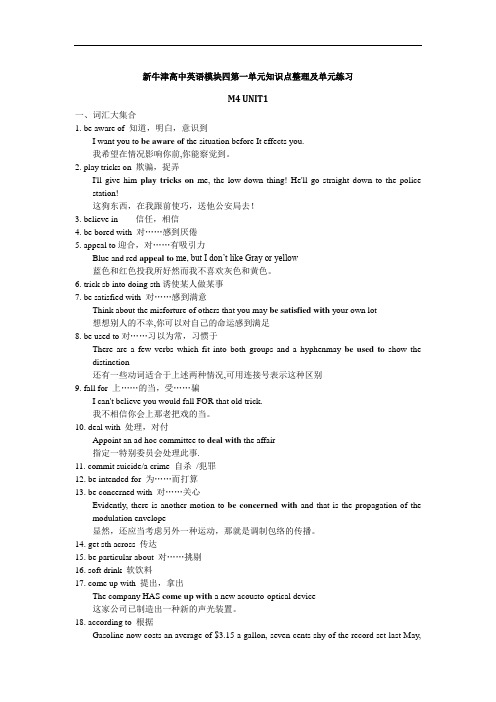
新牛津高中英语模块四第一单元知识点整理及单元练习M4 UNIT1一、词汇大集合1. be aware of 知道,明白,意识到I want you to be aware of the situation before It effects you.我希望在情况影响你前,你能察觉到。
2. play tricks on 欺骗,捉弄I'll give him play tricks on me, the low-down thing! He'll go straight down to the police station!这狗东西,在我跟前使巧,送他公安局去!3. believe in 信任,相信4. be bored with 对……感到厌倦5. appeal to迎合,对……有吸引力Blue and red appeal to me, but I don’t like Gray or yellow蓝色和红色投我所好然而我不喜欢灰色和黄色。
6. trick sb into doing sth诱使某人做某事7. be satisfied with 对……感到满意Think about the misforture of others that you may be satisfied with your own lot想想别人的不幸,你可以对自己的命运感到满足8. be used to对……习以为常,习惯于There are a few verbs which fit into both groups and a hyphenmay be used to show the distinction还有一些动词适合于上述两种情况,可用连接号表示这种区别9. fall for 上……的当,受……骗I can't believe you would fall FOR that old trick.我不相信你会上那老把戏的当。
新视野大学英语视听说教程第2册单元测试答案unittest4
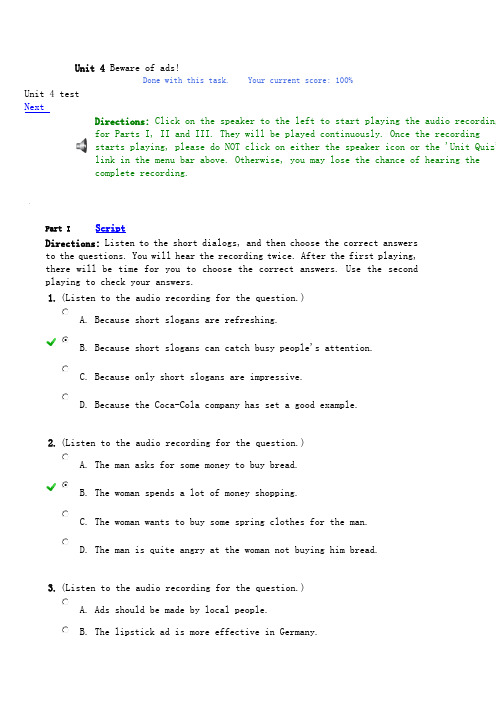
Unit 4 Beware of ads!Done with this task. Your current score: 100%Unit 4 testNextDirections: Click on the speaker to the left to start playing the audio recordingfor Parts I, II and III. They will be played continuously. Once the recordingstarts playing, please do NOT click on either the speaker icon or the 'Unit Quiz'link in the menu bar above. Otherwise, you may lose the chance of hearing thecomplete recording.Part I ScriptDirections: Listen to the short dialogs, and then choose the correct answersto the questions. You will hear the recording twice. After the first playing,there will be time for you to choose the correct answers. Use the secondplaying to check your answers.1.(Listen to the audio recording for the question.)A. Because short slogans are refreshing.B. Because short slogans can catch busy people's attention.C. Because only short slogans are impressive.D. Because the Coca-Cola company has set a good example.2.(Listen to the audio recording for the question.)A. The man asks for some money to buy bread.B. The woman spends a lot of money shopping.C. The woman wants to buy some spring clothes for the man.D. The man is quite angry at the woman not buying him bread.3.(Listen to the audio recording for the question.)A. Ads should be made by local people.B. The lipstick ad is more effective in Germany.C. Ads should be adapted for particular places.D. The same ad can be used in various places.4.(Listen to the audio recording for the question.)A. To show how fast one can buy things with the card.B. To show how much he likes the card.C. To express his disagreement with the woman.D. To express his agreement with the woman.5.(Listen to the audio recording for the question.)A. She is a loyal customer to Nokia.B. She is a loyal customer to Ericsson.C. She is easily influenced by advertisements.D. She is a tough consumer.Part II ScriptDirections: Listen to the following recording, and then fill in the blanks with the missing words. You will hear the recording twice. After the first playing, there will be time to write the missing words. Use the second playing to check your answers.W:So, Mr. Smith, you want to increase ridership on the buses.M:W:Certainly we can. First, we mustM:How do you do that?W:Well, we'llabout taking the bus. We'll investigate so on.M:Will that work?W:It workswe can see who we can Your answer Correct answer(1)We do We do (2)change the image change the image (3)do some surveys do some surveys (4)different age groupsdifferent age groups(5)all the time all the time (6)your users your users (7)targettargetPart III ScriptDirections: Listen to the following recording, and then choose the correctanswers to the questions. You will hear the recording twice. After the first playing, there will be time for you to choose the correct answers. Use the second playing to check your answers.1.Which of the following is NOT mentioned as a purpose of advertising?A. To encourage listeners to buy a product.B. To persuade readers to support an organization.C. To encourage readers to get rid of a certain idea.D. To persuade listeners to agree with a certain idea.2.According to the passage, who is most likely to pay for an ad?A. The advertiser.B. An advertising agency.C. The retailer.D. The shop.3.Which of the following is second in importance?A. Local advertising.B. Trade advertising.C. National advertising.D. Professional advertising.4.Which of the following is true of direct mail?A. Mail advertisements go to people with certain characteristics.B. Mail advertisements go to producers rather than professionals.C. Mail advertisements are more effective than TV commercials.D. Mail advertisements are more expensive than other forms ofadvertisements.5.What is the passage mainly talking about?A. The role of advertising in modern society.B. The definition and classification of ads.C. The effects of various types of ads.D. The importance of various types of ads.Part IVDirections: Choose the best answer to each of the following statements. 1.Dad, I need some new shoes. My old ones look ______ funny.A. kindB. a kindC. kind ofD. a kind of2.They probably give Yao Ming millions of dollars to wear those shoes. But if you bought me the shoes, I'd wear them ________.A. nothingB. with nothingC. in nothingD. for nothing3.In the States, advertisers are not allowed ________ young people smoking cigarettes.A. showB. showingC. to showD. to be shown4.Cigarette manufacturers need to keep _______ new customers.A. bringing aboutB. bringing toC. bringing forwardD. bringing in5.Manufacturers often spend large _______ of money on the advertisements.A. volumesB. numbersC. sumsD. dollars6."Don't _____ think about it!" is an expression commonly used in theUnited States when a person emphatically denies another personsomething.A. soB. reallyC. evenD. ever7.It is _____________ for us to specify what kind of people we want.A. too only naturalB. only too naturalC. too natural onlyD. only natural too8.Advertisers keep finding ways _____ the law.A. overB. aboutC. roundD. around9.Our student union should ___________ against smoking on campus.A. make some publicityB. do some publicityC. make some publicationD. do some publication10.We have everything you need. Stereos, video machines, refrigerators,dining room tables. _______; we have it.A. Naming itB. To name itC. You name itD. You put a name on it。
Beware of ads

A:Hellow,do you want to come shopping with me?B:Sure,what do you want to buy?A:Maybe some clothes and so on.And you?B:OK,just some snacks.For clothes,do you want to buy which advertised by movie stars?A:Oh,I think the clothes advertised by movie stars are very cool,and the quility is also perfect.B:But don't you think it's too high to buy?A:You are right,it's really expensive.But just buy one is enough.What about you ? B:I think the famous lable dosen't mean the good quility,so I will buy clothes which have good quility.A:Maybe you are right.What do you think about the reason of high price?B:Manufacture will spend a lot of money on advertisements and some people think the higher the better,so them make the price so high.In fact the cost price is not so much.A:Oh,I'm agree with you !B:What's your opinion of the large amounts of money spent on ads for two competing products?A:As far as I'm concerned they make the products' price higher and higher,May be they will earn much money,but it's really harmful for us.B:Yes,it's bad for us.A:Do you believe the advertisement?And should people buy things according to what ads say?B:I think the advertisement is not really true,so we should buy things according to our own idea.For example,the color,the set, the style,and so on.Just buy one which you like.A:Yes,we shouldn't buy things without consideration.B:Now the advertisements become more and more,some of them are not really good for us,do you know what are the negative social effects of advertisements?A:It's true,the advertisements sometimes will stupid the custom and make them buy it without consideration.B:I have went through the thing.I buy a product which ads well,when I use it,there are so many problems that I can not continuly use it.A:And what did you do after that?B:I call the phone of their company,and want to get a saitisfied answer,there just had some apologizes for me.A:Oh waht a pity,it's time to go shopping now,let go.B:OK.。
新视野大学英语视听说教程第二册答案
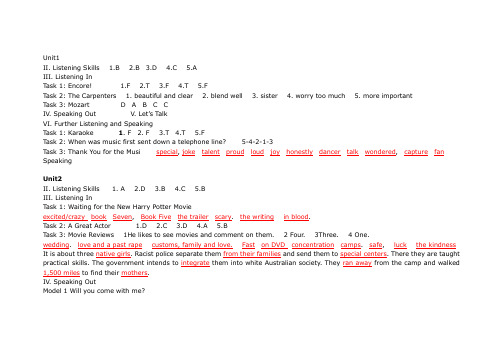
Unit1II. Listening Skills 1.B 2.B 3.D 4.C 5.AIII. Listening InTask 1: Encore! 1.F 2.T 3.F 4.T 5.FTask 2: The Carpenters 1. beautiful and clear 2. blend well 3. sister 4. worry too much 5. more importantTask 3: Mozart D A B C CIV. Speaking Out V. Let’s TalkVI. Further Listening and SpeakingTask 1: Karaoke 1. F 2. F 3.T 4.T 5.FTask 2: When was music first sent down a telephone line? 5-4-2-1-3Task 3: Thank You for the Musi special, joke talent proud loud joy honestly dancer talk wondered, capture fan SpeakingUnit2II. Listening Skills 1. A 2.D 3.B 4.C 5.BIII. Listening InTask 1: Waiting for the New Harry Potter Movieexcited/crazy book Seven, Book Five the trailer scary. the writing in blood.Task 2: A Great Actor 1.D 2.C 3.D 4.A 5.BTask 3: Movie Reviews 1He likes to see movies and comment on them. 2 Four. 3Three. 4 One.wedding. love and a past rape customs, family and love.Fast on DVD concentration camps. safe, luck the kindness It is about three native girls. Racist police separate them from their families and send them to special centers. There they are taught practical skills. The government intends to integrate them into white Australian society. They ran away from the camp and walked 1,500 miles to find their mothers.IV. Speaking OutModel 1 Will you come with me?Model 2 What did you think about the movie?Model 3 The plot is first-class.V. Le t’s T alk 1. A 2.C 3.DVI. Furthering Listening and SpeakingListeningTask 1: Only One Line 1memorizing lines 2 remember one line 3 I hear the guns roar 4 a loud boom 5 his line Task 2: An Interview with J.K. Rowling 1T 2F 3F 4T 5 FTask 3: The Secret of the Next Harry Potter Book 1. D 2.C 3.A 4.BSpeakingUnit3II. Listening Skills 1.B 2.C 3.D 4.A 5.ASpeakingTask 1: Don’t be a chicken! 1. go out 2. flaming red 3. has a crush on 4. a chicken 5. likes 6. the guts 7. turn him down 8. know 9. keeping everything to himself 10. how to tell herTask 2: Problem of Meeting People 1.F 2.F 3.T 4.T 5.FTask 3: Long Distance Friendships 1. A 2.B 3.C 4.D 1-3-7-5-4-2-6IV. Speaking OutModel 1 I just broke up with Alice!Model 2 Leo proposed to me.Model 3 There’s something about him.V. Let’s T alkDating DescriptionCausal dating Early teensSteady dating Late teensMany partners e.g. a dance, a game, a picnicDouble dating Two couplesGroup dating Large groupsGo out for a long period Intention to marryAdult dating Men and women.e.g.ski, work, dine together Casual dating system Those who hardly know each otherBlind dating Those who have never met beforeVI. Furthering Listening and SpeakingTask 1: Finding the Right Type of Girl 1.B 2.D 3.C 4.ATask 2: He thinks I’m God. 1.F 2.T 3.F 4.T 5.TTask 3: LadyIII. Listening InUnit4II. Listening Skills 1-i 2-a 3-f 4-b 5-c 6-d 7-h 8-g 9-e III. Listening InTask 1: The Influence of Advertising 1.T 2.F 3.F 4.T 5.FTask 3: Don’t even think about it! 1. A 2.D 3.B 4.C 5.CIV. Speaking OutModel 1 Who pays?Model 2 Beware of ads!Model 3 Are the free magazines free?V. Let’s T alk Persons/Agencies Words/Actions Reasons/PurposesA firmadvertised for a friendly employee;Was asked to change the wordingdiscrimination against unfriendly peopleTravelcorequested for a friendly employeeto provide food for its staff/employeesThe Job Centertold the Travelco managing director to remove the word “friendly”The managing directorsaid was told not to use that word; thought it was ridiculousIt was natural to specify the kind of people they wantedadded that the people at the center thought they had been a little over the top The centerhad decided that certain words were not allowed; e.g. motivated, enthusiastic An officialsaid they had guidelines of not using personality characteristicsno discriminationadded that they should leave the dispute to the local judgesto make the final decisionmaybe a member of their staff had been over-enthusiasticin cutting wordsVI. Furthering Listening and SpeakingTask 1: Banning Cigarette Ads1.They have banned tobacco/cigarette ads completely.2.Advertisers are not allowed to show young people smoking cigarettes.3.They keep finding ways around the law.4.They must keep bringing in new customers, as the old ones are dying of lung cancer.5.IT should do some publicity against smoking on campus.Task 2: A Radio Commercial 1.F 2.F 3.T 4.F 5.TTask 3: An Introduction to Advertising 1.A 2.C 3.B 4.D 5.DSpeakingUnit5II. Listening Skills 1. A 2. B 3.B 4.D 5.CIII. Listening InTask 1: Dogs aren’t allowed here! 1. allowed movie theater 2. a ticket 3. well trained intelligent human 4.any problem leave the theater any other dog seen 5. almost emptyTask 2: Put the cat out! 4-1-3-5-2-6 D) She was ill-treated at home.Task 3: A Sudden Change in the Parrot’s Attitude 1.C 2.D 3.B 4.C 5.AIV. Speaking OutModel 1 The dog will be company for her.Model 2 Where to walk dogs?Model 3 What does having a few fish do for you?V. Let’s T alkCharactersActions and WordsA dogwalked into a butcher’s shop with five dollars;fixed eyes on the lamb chops and barked—wanted some.The butcherpicked up the worst/lowest quality chops.The dogbarked angrily and continuouslyThe butcherselected the finest chops;took the money.The dogleft.The butcherwanted to own/have such a dog;followed the dog.The dogentered an apartment houseclimbed to the third floor;scratched on the door.A manopened the door;yelled at the dog.The butcherasked him to stop,saying it was the smartest/cleverest animal;explained how the dog had got the best lamb chops.The manlooked at him sideways;said it was the third time this week the dog had forgotten his key.VI. Furthering Listening and SpeakingTask 1: A Birthday PresentAfter David gave his mom a dog as a birthday present, she was very pleased, for the dog licked her hand and wagged its tail. She calledit Brian after one of her friends. Mary read an article which says that dogs can be faithful to their owners/masters. David agreed, for he saw a TV interview which introduced a dog that could warn its master of an epileptic attack. He explained that this ability of the dog’s has something to do with its keen sense of smell. Jokingly, Mary said she wounded whether the dog Brian can foretell/predict when David’s mom is going to roast a chicken.Task 2: 100 Percent Polar Bear 1.T 2.F 3.F 4.T 5.FTask 3: An Introduction to Advertising 1.D 2.C 3.B 4.A 5.DSpeakingUnit6II. Listening Skills 1. B 2. No, she hasn’t.III. Listening In 1looks funny 2looks fine to her 3is behind the times 4went out 5looks good on her 6 out-dated 7keeping herself in style 8 no wonderTask 2: How is fashion decided?Task 1: A Woman’s Funny Dress 1. F 2.F 3.T 4.T 5.FFashion designers design fashionable clothes,begin trends and new styles,and their work is copied all over the world.Paris is the center of the world fashion, where the secrets of the new designs are guarded until they are shown to the publicPeople and manufacturers come to Paris to buy and copy new clothes, in January and July. Then the clothes are copied and made up in large numbers, for which one does not have to pay a high price.Other manufacturers use Paris styles simply as a starting point for their own ideas.Still others adapt only a part of the French designTask 3: Dreaming of Being a Fashion Model 1.D 2.B 3.A 4.B 5.CFuture models…..being at least 5’8” tallKimi…………..massaging one’s feetA part of the brain……producing growth hormones directlyCustomers…….buying KimiIV. Speaking OutModel 1 How did you like the fashion show?Model 2 I’m looking for a light jacket.Model 3 Could you show me a pair of running shoes?V. Let’s T alk 1.D 2.D 3.A 4.C 5.BVI. Furthering Listening and SpeakingTask 1: Paying for the New ClothesThe daughter wants to buy new clothes, but the mother disagrees, saying she still has a lot of clothes in good condition and the parents have to pay for the university tuition. The daughter argues that she needs clothes in fashion, so as not to look as if she had come form the middle ages. The daughter then suggests getting a part-time job to cover the expenses. Not wanting to affect the daughter’s studies, the mother finally agrees to buy new clothes.Task 2: A Model’s Description of Her Work 1.T 2.F 3.T 4.F 5.FTask 3: Itsy Bitsy Teenie Weenie Yellow Polka-dot BikiniNervous afraid first time locker blanket come out woreSpeaking。
《大学英语(二本)课程教学大纲》
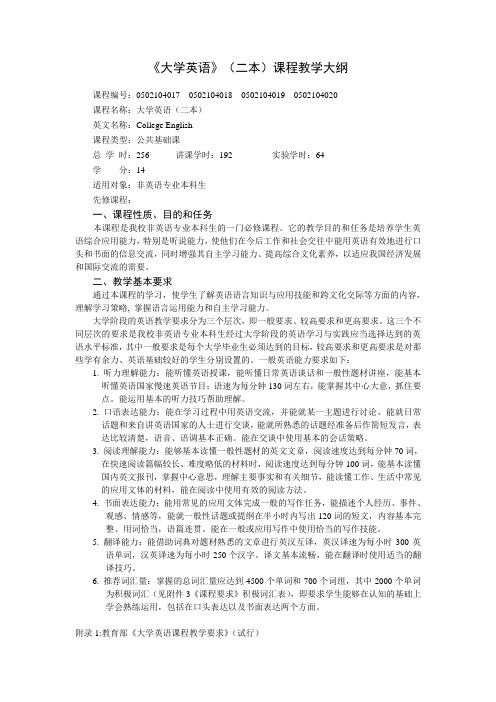
《大学英语》(二本)课程教学大纲课程编号:0502104017 0502104018 0502104019 0502104020课程名称:大学英语(二本)英文名称:College English课程类型:公共基础课总学时:256 讲课学时:192 实验学时:64学分:14适用对象:非英语专业本科生先修课程:一、课程性质、目的和任务本课程是我校非英语专业本科生的一门必修课程。
它的教学目的和任务是培养学生英语综合应用能力,特别是听说能力,使他们在今后工作和社会交往中能用英语有效地进行口头和书面的信息交流,同时增强其自主学习能力、提高综合文化素养,以适应我国经济发展和国际交流的需要。
二、教学基本要求通过本课程的学习,使学生了解英语语言知识与应用技能和跨文化交际等方面的内容,理解学习策略, 掌握语言运用能力和自主学习能力。
大学阶段的英语教学要求分为三个层次,即一般要求、较高要求和更高要求。
这三个不同层次的要求是我校非英语专业本科生经过大学阶段的英语学习与实践应当选择达到的英语水平标准,其中一般要求是每个大学毕业生必须达到的目标,较高要求和更高要求是对那些学有余力、英语基础较好的学生分别设置的。
一般英语能力要求如下:1. 听力理解能力:能听懂英语授课,能听懂日常英语谈话和一般性题材讲座,能基本听懂英语国家慢速英语节目;语速为每分钟130词左右,能掌握其中心大意,抓住要点。
能运用基本的听力技巧帮助理解。
2. 口语表达能力:能在学习过程中用英语交流,并能就某一主题进行讨论,能就日常话题和来自讲英语国家的人士进行交谈,能就所熟悉的话题经准备后作简短发言,表达比较清楚,语音、语调基本正确。
能在交谈中使用基本的会话策略。
3. 阅读理解能力:能够基本读懂一般性题材的英文文章,阅读速度达到每分钟70词,在快速阅读篇幅较长、难度略低的材料时,阅读速度达到每分钟100词,能基本读懂国内英文报刊,掌握中心意思,理解主要事实和有关细节,能读懂工作、生活中常见的应用文体的材料,能在阅读中使用有效的阅读方法。
- 1、下载文档前请自行甄别文档内容的完整性,平台不提供额外的编辑、内容补充、找答案等附加服务。
- 2、"仅部分预览"的文档,不可在线预览部分如存在完整性等问题,可反馈申请退款(可完整预览的文档不适用该条件!)。
- 3、如文档侵犯您的权益,请联系客服反馈,我们会尽快为您处理(人工客服工作时间:9:00-18:30)。
Sample dialog. Pay attention to the colored expressions.
A: Shall we switch to another channel? I don’t like those TV commercials. B: Why do you think so? Look: Just do it! What a powerful product. A: I doubt it. B: Now, look at this L’Oreal commercial. The model’s skin is so smooth. A: This is what they want you to believe: use the product and you will get the same skin. B: you mean they are lying about the product? I don’t really think so. A: Advertisers now appeal to emotions, not reason. They want you to like their product. B: Well, I don’t really agree with you, but we can switch to another channel.
Useful expressions for the divertising produces a good image of a product. The advertisements create a favorable/positive image of a product. Ads make the product attractive. What do you mean by consumer brand loyalty? Could you explain “consumer brand loyalty”? Pardon? What are you trying to say? It means … What I means is… What I’m trying to say is… What I wanted to say was…
Useful expressions for the dialog.
…spend piles of money to increase their market shares… …spend huge sums to enlarge/expand their market shares… … do anything to grab a bigger market share… …the extra costs of advertising will be passed on to the consumers. … the extra costs of advertising will be borne by consumers. Consumers will have to foot the bill for advertising.
UNIT 4
Beware of ads!
I. Lead-in
What is your opinion of the large amounts of money spent on ads for two competing products? Should people buy things according to what ads say? What are the negative social effects of advertisements? Should young people buy the clothes advertised by movie stars?
Useful expressions for the dialog.
I think the Pepsi commercial is just as attractive… The Pepsi commercial is equally fascinating. The commercial for Pepsi is the real thing. …the competitors are just canceling out each other’s efforts. The two competitors are cutting each other’s throats. Neither of the two will get anywhere in that competition.
II. Create a dialog with your partner according to the table below, referring to the useful expressions in the boxes if necessary.
Role A Praises Ericsson’s TV ad: “Make yourself heard!” Consumers will pay. Asks for the meaning of “consumer loyalty”. Mentions a contradiction between increased sales and more advertising. Role B Praises Nokia’s ad: “Connecting People”. Agrees by mentioning “consumer loyalty”. They keep buying the product. Agrees.
Useful expressions for the dialog.
…consumers are loyal to a certain product… Consumers identify with that product. Consumers keep going back to that product. …more sales mean lower production costs That mass production means lower production costs. Increased sales lead to a lower per unit. …more advertising means higher costs to the consumer. Advertising results in greater costs for consumers. Consumers will pick up the tab/bill for extra advertising.
Useful expressions for the dialog.
Mind if I switch to another channel? May I change channel? Those TV commercial are killing me. I can’t stand any more TV commercial. There’s a product you can depend on. You can trust that product. If I were you, I wouldn’t trust those commercials. I don’t trust commercials. …there’s such a warm family feeling. It is the sort of warmth you feel in a family.
IV. Create a dialog with your partner according to the table below, referring to the useful expressions in the boxes if necessary.
B is reading a brochure full of ads. A thinks advertising costs too much money and consumers have to pay more because of the ads., whereas B thinks advertising tells people about products.
Sample dialog. Pay attention to the colored expressions.
A: Look, “Make yourself heard!” The Ericsson’s TV commercial is so cool. B: I think the Nokia’s commercial is just as fascinating: “Connecting people”. A: I’m afraid consumers will have to pay for the advertising. B: I hear that the advertisements create a favorable image or product, and that leads to consumer loyalty brand. A: Could you explain “consumer brand loyalty?” B: I mean consumer identify with the product and keep buying it. Sometimes they’re even willing to pay more. A: It is contradictory that increased sales lead to a lower production cost per unit, but more advertising results in greater costs for consumers. The winner is always the company. B: I agree.
